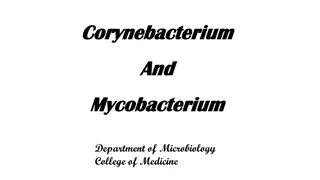Overview of Corynebacterium: Characteristics, Infections, and Laboratory Diagnostics
Corynebacterium is a genus of Gram-positive rod-shaped bacteria widely distributed in nature. They are catalase positive, non-spore-forming, non-motile bacteria with unique morphological features. The most notable human infection caused by Corynebacterium is diphtheria, characterized by the formatio
0 views • 25 slides
Overview of Corynebacterium diphtheriae Pathogenesis and Virulence Factors
Corynebacterium diphtheriae is a non-spore forming Gram-positive bacillus responsible for causing diphtheria in humans. This bacterium, particularly C. diphtheriae, is known for producing a potent exotoxin called diphtheria toxin, which blocks protein synthesis and leads to serious complications suc
0 views • 25 slides
Understanding Bacterial Toxins: Production, Types, and Effects
Explore the world of bacterial toxins, focusing on production mechanisms, various types such as cytotoxins and their effects on host cells. Delve into specific examples like Diphtheria Toxin caused by Corynebacterium diphtheriae, understanding its biological features and the disease it leads to.
0 views • 13 slides


